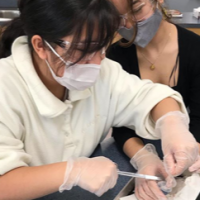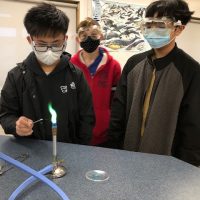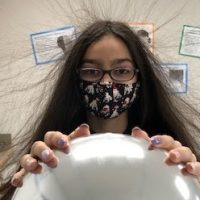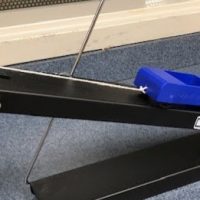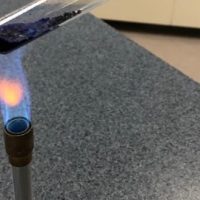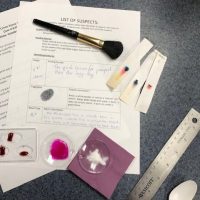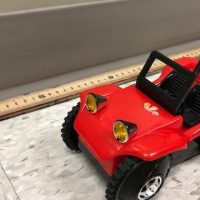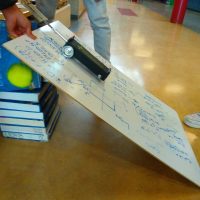| DAVIES, Darrin | Darrin.Davies@burnabyschools.ca | Biology |
| LABRASH, Sara | Sara.LaBrash@burnabyschools.ca | Physics |
| LANDSBERG, Naomi | Naomi.Landsberg@burnabyschools.ca | Biology | STEAM |
| RANA, Savitri | Savitri.Rana@burnabyschools.ca | Science |
| ROODBOL, Ben | Ben Roodbol@burnabyschools.ca | Science |
| SEKULOVICH, George | George.Sekulovich@burnabyschools.ca | Science |
| VIRANI, Tanya | Tanya.Virani@burnabyschools.ca | Department HeadChemistry |
| WILSON, Tammy | Tammy.Wilson@burnabyschools.ca | Biology |
SCIENCE 8
The Science 8 curriculum uses models to explore scientific ideas. What’s inside a cell? What are the building blocks that make up our world? How do waves behave? How do our eyes work? What causes earthquakes, volcanoes, and the landscape around us? Students learn to work safely in a laboratory setting as we explore these ideas together.
STEAM PROGRAM
The STEAM program is an integrated Science, Technology, Engineering, Art, and Math program. Students in the STEAM program will learn skills like Coding, Robotics, Electronics, Drafting, Art (traditional and digital media) and Engineering. Click here for information about the STEAM program.
SCIENCE 9
The Science 9 curriculum focuses on cycles and relationships. How and why do elements react with one another? Why do different species reproduce in different ways? How do cell processes support reproduction? How can we build and adjust electrical circuits? How do human actions impact our environment? Explore the cause & effect relationships in the world around us.
SCIENCE 10
The Science 10 curriculum focuses on conservation: everything comes from somewhere! How is matter rearranged in chemical reactions? Which principles govern energy transformations? How is genetic information conserved when we inherit traits from our parents? How does conservation apply to an expanding universe? Science 10 builds proficiency with science terminology and mathematical approaches students will use extensively at the grade 11 & 12 level.
CHEMISTRY 11
Chemistry is the central discipline that connects the branches of science, since matter and its reactions affect every aspect of our world. A strong basis in chemistry is useful for all science pathways. Chemistry 11 reviews and deepens students’ understanding of atoms and molecules, reactions, and chemical naming. It then introduces the mole concept as a tool for mathematical analysis of chemical reactions. Through this course students will develop practical laboratory skills along with their ability to answer questions using scientific experiments. Students will be most successful in Chemistry 11 if they enter the course with a solid background in Science 10 and Mathematics 10.
CHEMISTRY 11 HONOURS
* Teacher recommendation required
This course should be considered the first year of a two-year program that leads to the completion of Advanced Placement Chemistry 12. This course deals with the topics of Chemistry 11 in greater depth and includes some topics from A.P. Chemistry 12. The presentation of material is not linear; therefore, it is required that students enroll for both years of the program (11 HONOURS followed the next year by 12 AP)
EARTH SCIENCE 11
What causes earthquakes and volcanoes? Why is our climate changing? Have you ever wanted to grow your own mineral crystals? How can we be sustainable when honourably harvesting earth’s resources? What do we know about the origins and workings of our planet and universe? Earth Science 11 explores these questions through lab work, field studies and scientific theory.
LIFE SCIENCES 11
Life Sciences 11 is designed to foster a sense of wonder about non-human life – single-celled creatures, plants, fungus, and animals. The more we connect to the living world, the more we are empowered to care for it. Find out how life on Earth is related and how it came to be so diverse. Explore how different creatures’ body structures help them survive, and how different species interact with one another in their environments. Topics in this course provide the foundation for future studies in biology. Life Sciences 11 students should be prepared to build an extensive subject-specific vocabulary so that they can understand and express course ideas proficiently.
LIFE SCIENCES 11 HONOURS & AP BIOLOGY
* Partner courses taken with teacher recommendation
* Students will sign up for both and complete them in a single school year.
Life Sciences (Biology) 11 Honours is the first half (first semester) of the AP Biology program. It includes more intensive coverage of the topics in Life Sciences 11 as well as additional material from the AP Biology University level curriculum. Biology 12 AP (Advanced Placement) is the second half (second semester) of the AP Biology program. It is a higher-level Biology course equivalent to a first-year university offering. In addition to the Anatomy & Physiology 12 curriculum, topics will include Molecules and Cells, Heredity and Evolution, and Organisms and Populations. The AP Biology course is designed to enable students to develop advanced inquiry and reasoning skills, such as designing a plan for collecting data, analyzing data, applying mathematical routines, and connecting concepts in and across domains. This course will prepare students for the Biology College Board Advanced Placement Exam. After showing themselves to be qualified on the AP Exam (graded on a 5-point scale), some students, in their first year of college, are permitted to take upper-level courses in biology or register for courses for which biology is a prerequisite.
PHYSICS 11
Physics 11 will cover four big ideas: Motion, Forces, Energy and Waves with a major focus on describing how objects move in one-dimension and two-dimensions. This course serves as a foundation for many post-secondary courses in science, engineering and kinesiology as well as for Physics 12. A willingness to work in the language of math is crucial in this course as equation manipulation and right-angle trigonometry will be used extensively; creative and critical thinking will be practiced regularly.
SCIENCE FOR CITIZENS 11
Science for Citizens 11 invites students to explore scientific concepts and processes that are relevant to their daily lives. It focuses on application of knowledge to real-world situations, and helps students build their skills in the areas of evidence-based decision making and scientific literacy. This course incorporates hands-on and project-based learning as often as possible. The curriculum in Science for Citizens is flexible, allowing each class to pursue topics of interest. Possible units include human health, environmental science, forensics, household chemistry, disaster preparedness, lab skills and procedures (including workplace safety), forces and machines, engineering/design, and more. Because the topics in this course are not the same from year to year, some post-secondary programs do not accept Science for Citizens as a science entrance requirement. Students wishing to pursue post-secondary studies should check their program requirements when selecting a Science 11 course.
ANATOMY AND PHYSIOLOGY 12
Anatomy & Physiology 12 is the owner’s manual for your human body! Explore what your body is made of, and how body systems work together to maintain balance and wellness. Learn about cell structure, biochemical processes, and organ systems. Investigate how the body may respond to illnesses and/or infections. Anatomy & Physiology 12 explores increasingly sophisticated systems and relationships, and students will require strong reading comprehension/vocabulary to communicate proficient learning. While Life Sciences 11 is not a prerequisite, it is valuable preparation for this course. Students wishing to go directly into A&P 12 are encouraged to consult with a senior biology teacher to fully understand this choice.
CHEMISTRY 12
Welcome to the “why” of chemistry! More challenging, more theoretical and more intriguing than Chemistry 11 – Chemistry 12 delves deeper into the central principles governing chemical interactions. Reaction kinetics and equilibrium are explored in the contexts of solubility, acid/base chemistry, and oxidation/reduction reactions. As Chemistry 12 is more demanding in its reasoning and mathematical problem-solving, we strongly recommend that students have at least a C+ grade in Chemistry 11, a strong math background, and an interest in laboratory work.
CHEMISTRY 12 ADVANCED PLACEMENT
* Teacher recommendation required
This is a higher-level chemistry course that is equivalent to a first-year university offering. Topics will include reaction types, atomic and molecular structure, equilibrium, kinetics, quantum mechanics, and thermodynamics, to name only a few. The program is an integrated two-year program which covers provincial grade 11 and 12 topics, as well as first year university. The presentation of material is not linear, therefore it is required that students enroll for both years of the program (11 Honours followed by 12 AP).Prerequisite: Chemistry 11 Honours.
PHYSICS 12
Physics 12 is developed around four big ideas: Frames of Reference, Forces, Fields, and Conservation. Students will build upon their knowledge and skills developed in Physics 11 with additional study on physical laws, their related theories, and the mathematical relationships. As Physics 12 involves more abstract thinking and mathematical processing, we strongly recommend a grade of C+ or higher in Physics 11 and a willingness to work in the language of math.
PHYSICS ADVANCED PLACEMENT (AP PHYSICS I and II)
* Teacher recommendation required
Advanced Placement (AP) Physics I is an intensive study in a range of physics topics including Kinematics (linear and rotational), Forces, Energy, Momentum, Torque, Circuits, and Optics. This course demands motivated students who are enthusiastic to address the material quickly and who will complete independent study on the concepts. Fluency in the language of math is critical in this course as equation manipulation and trigonometry will be used regularly. There is an opportunity to complete an AP Exam associated with AP Physics I.
AP Physics II, which explores Fluids, Electric Force and Fields, Electromagnetism, and Optics, may be pursued after AP Physics I or Physics 12, upon recommendation by a physics teacher.

